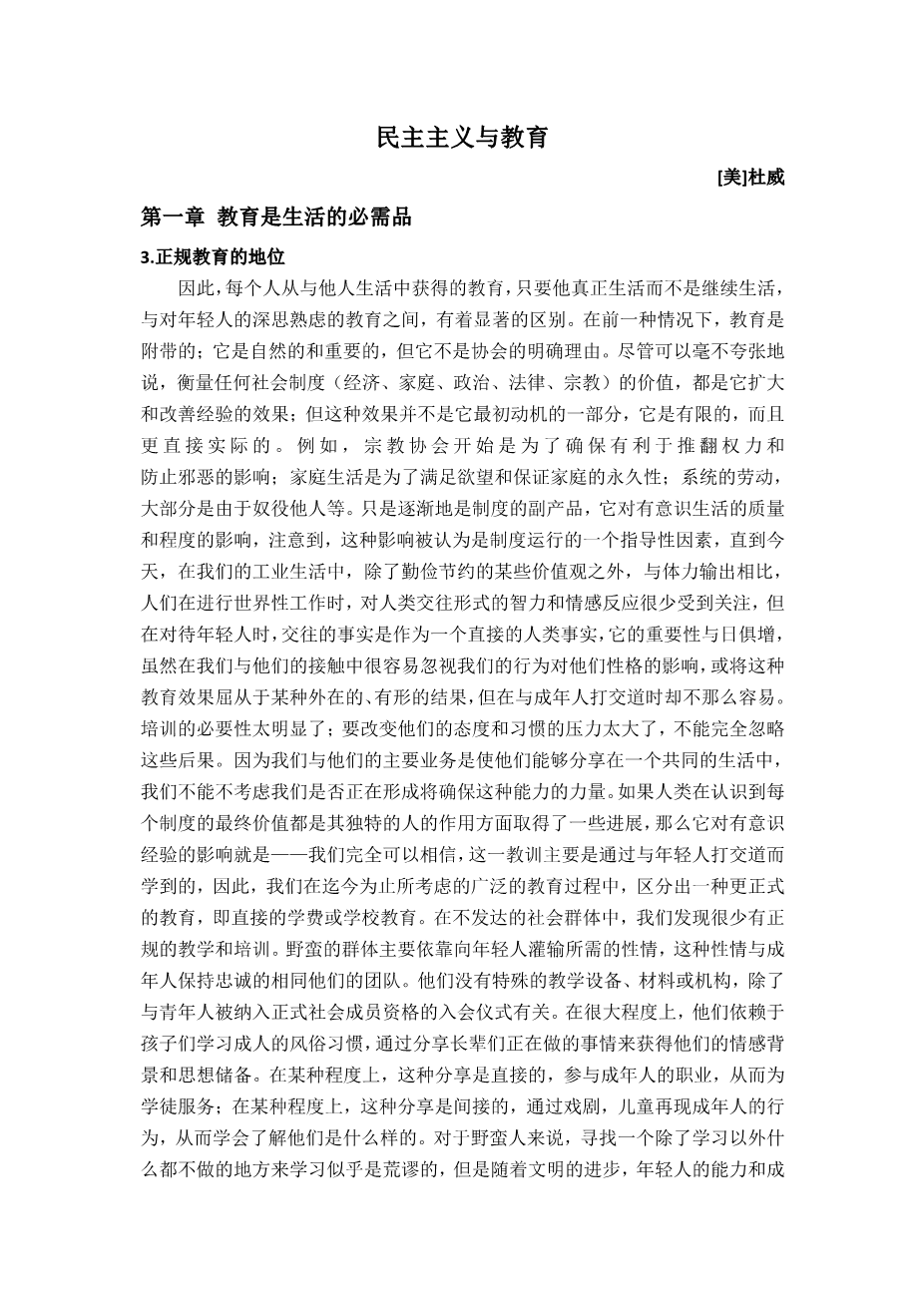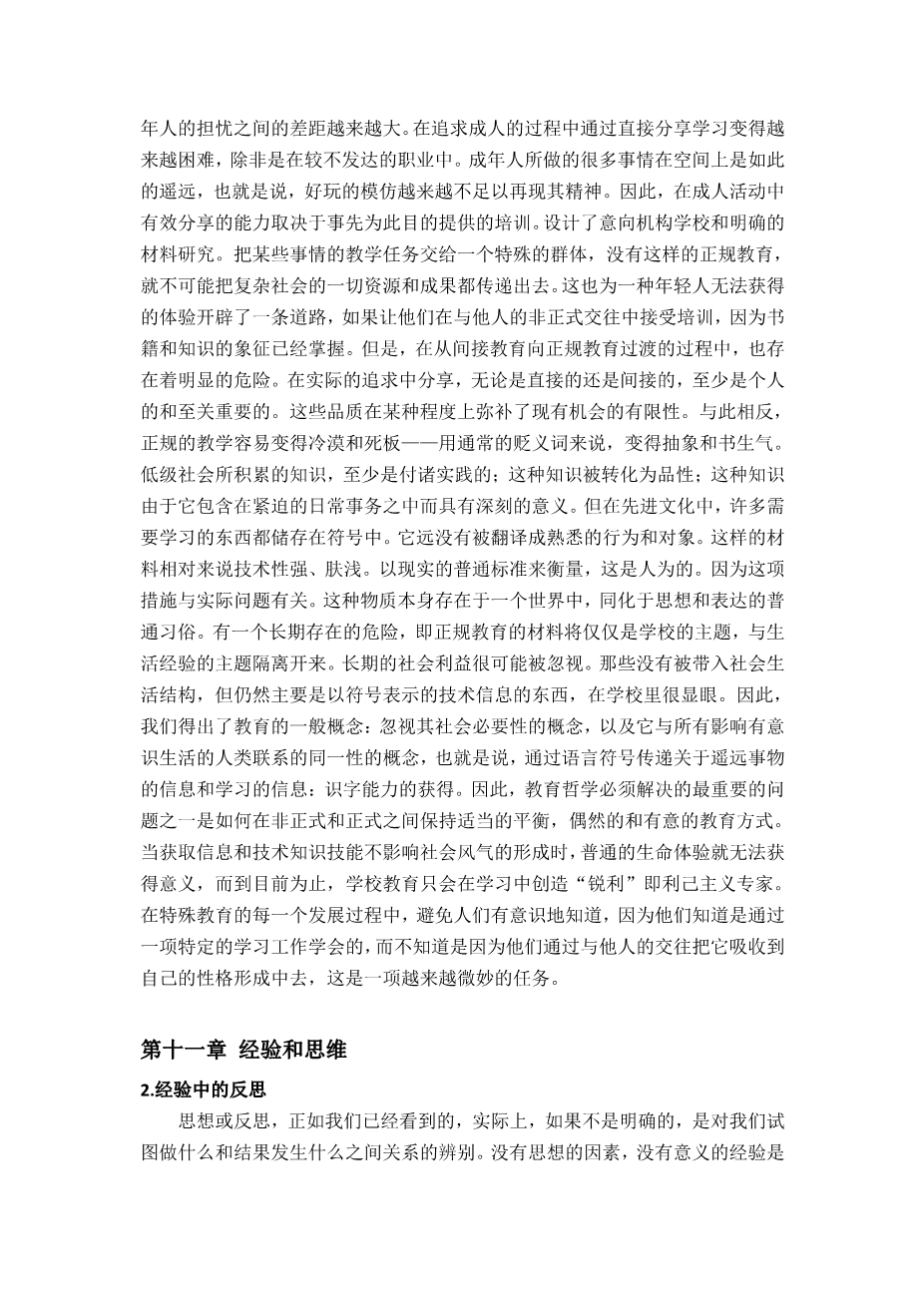英语原文共 6 页,剩余内容已隐藏,支付完成后下载完整资料
Democracy and Education
By John Dewey
Chapter One: Education as a Necessity of Life
3. The Place of Formal Education. There is, accordingly,a marked difference between the education which every one gets from living with others, as long as he really lives instead of just continuing to subsist, and the deliberate educating of the young. In the former case the education is incidental; it is natural and important, but it is not the express reason of the association. While it may be said, without exaggeration, that the measure of the worth of any social institution,economic, domestic,political, legal, religious, is its effect in enlarging and improving experience; yet this effect is not a part of its original motive, which is limited and more immediately practical. Religious associations began, for example, in the desire to secure the favor of overruling powers and to
ward off evil influences; family life in the desire to gratify appetites and secure family perpetuity; systematic labor,for the most part, because of enslavement to others, etc.Only gradually was the by-product of the institution, its effect upon the quality and extent of conscious life, noted,
and only more gradually still was this effect considered as a directive factor in the conduct of the institution.Even today, in our industrial life, apart from certain values of industriousness and thrift, the intellectual and emotional reaction of the forms of human association under which the worldrsquo;s work is carried on receives little attention as compared with physical output.But in dealing with the young, the fact of association
itself as an immediate human fact, gains in importance.While it is easy to ignore in our contact with them the effect of our acts upon their disposition, or to subordinate that educative effect to some external and tangible result, it is not so easy as in dealing with adults. The need of training is too evident; the pressure to accomplish a change in their attitude and habits is too urgent to leave these consequences wholly out of account. Since our chief business with them is to enable them to share
in a common life we cannot help considering whether or no we are forming the powers which will secure this ability. If humanity has made some headway in realizing that the ultimate value of every institution is its distinctively human effect—its effect upon conscious experience—
we may well believe that this lesson has been learned largely through dealings with the young.We are thus led to distinguish, within the broad educational process which we have been so far considering, a more formal kind of education—that of direct tuition or schooling. In undeveloped social groups, we find very little formal teaching and training. Savage groups mainly rely for instilling needed dispositions into the young upon the same sort of association which keeps adults loyal to
their group. They have no special devices, material, or institutions for teaching save in connection with initiation ceremonies by which the youth are inducted into full social membership. For the most part, they depend upon children learning the customs of the adults, acquiring their emotional set and stock of ideas, by sharing in what the elders are doing. In part, this sharing is direct,taking part in the occupations of adults and thus serving an apprenticeship; in part, it is indirect, through the dramatic plays in which children reproduce the actions of grown-ups and thus learn to know what they are like. To savages it would seem preposterous to seek out a place where nothing but learning was going on in order that one might learn.But as civilization advances, the gap between the capacities of the young and the concerns of adults widens.
Learning by direct sharing in the pursuits of grown-ups becomes increasingly difficult except in the case of the less advanced occupations. Much of what adults do is so remote in space and in meaning that playful imitation is less and less adequate to reproduce its spirit. Ability to share effectively in adult activities thus depends upon a prior training given with this end in view. Intentional agencies—schools—and explicit material—studies—are devised. The task of teaching certain things is delegated to a special group of persons.Without such formal education, it is not possible to transmit all the resources and achievements of a complex society. It also opens a way to a kind of experience which would not be accessible to the young, if they were left to pick up their training in informal association with others, since books and the symbols of knowledge are mastered. But there are conspicuous dangers attendant upon the transition from indirect to formal education. Sharing in actual pursuit, whether directly or vicariously in play, is at least personal and vital. These qualities compensate,in some measure, for the narrowness of available opportunities. Formal instruction, on the contrary, easily be?comes remote and dead—abstract and bookish, to use the ordinary words of depreciation. What accumulated knowledge exists in low grade societies is at least put into practice; it is transmuted into character; it exists with the depth of meaning that attaches to its coming within urgent daily interests.But in an advanced culture much which has to be learned is stored in symbols. It is far from translation into familiar acts and objects. Such material is relatively technical and superficial. Taking the ordinary standard of reality as a measure, it is artificial. For this measure is connection with practical concerns. Such material exists in a world by itself, assimilation to ordinary customs of thought and expression. There is the standing danger that the material of formal instruction will be merely the subject matter of the schools, isolated from the subject matter of life- experience. The permanent social interests
剩余内容已隐藏,支付完成后下载完整资料
资料编号:[271926],资料为PDF文档或Word文档,PDF文档可免费转换为Word
课题毕业论文、外文翻译、任务书、文献综述、开题报告、程序设计、图纸设计等资料可联系客服协助查找。




